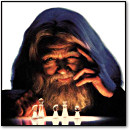October 1st, 2012 by Benj Edwards

Ten years ago today, I opened an experimental music website called Request-A-Song.com. On the site, my brother Jeremy and I solicited song titles (just titles, not lyrics), which site visitors would submit via a web form. We’d pick the ones we found most inspiring and write songs based on them, then publish them on the site in MP3 format. The project lasted until December 2005.
As you might expect, a lot of very interesting and unusual songs came out of the process. You can tell just by reading the titles of our most popular songs — names like “Butter Ghost,” “Violent House Panda,” “Poke ‘Em In The Neck,” and “I Flipped My Biscuit” — that we preferred ideas on the bizarre end of the spectrum.
 In honor of our 10th anniversary, I’ve uploaded all 134 of our songs to The Internet Archive with the hope that it will preserve our effort for posterity.
In honor of our 10th anniversary, I’ve uploaded all 134 of our songs to The Internet Archive with the hope that it will preserve our effort for posterity.
You can still download those songs from the original Request-A-Song.com website (which also provides information on who requested what and when, lyrics, and dates of release), but it’s actually easier to explore our catalog with the IA’s handy online streaming MP3 app.
(If you want to know which songs to listen to first, here is a list of our 25 most popular songs.)
Over the next month, I plan on uploading more RAS information to the Internet Archive, including news archives, press clippings, song metadata, images, and more.
[ Continue reading Experimental Music Site Request-A-Song.com Turns 10 » ]
Posted in Computer History, Internet History, News & Current Events, Vintage Computing | 5 Comments »
Tags: 2002, Internet history, MP3, Online music, Request-A-Song.com, web history
October 1st, 2012 by Benj Edwards
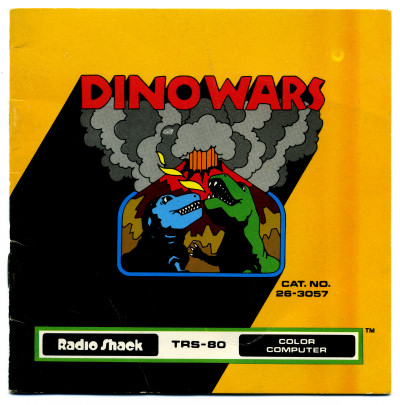 Dino Wars cast a long shadow in the world of manual covers.
Dino Wars cast a long shadow in the world of manual covers.
[ From Dinowars manual Cat. No. 26-3057, September 1980, cover ]
Discussion Topic of the Week: Off the top of your head, name the first video game you can think of that involves dinosaurs.
Posted in Computer Games, Computer History, Gaming History, Regular Features, Retro Scan of the Week, Retrogaming, Vintage Computing | 10 Comments »
October 1st, 2012 by Benj Edwards

Thirty years ago today, Sony released the first commercially available Compact Disc player, the CDP-101. It launched alongside 50 CDs in Japan, marking the commercial birth of the widely popular digital audio medium.
Over at TechHive (a new site run by the folks behind PC World), I’ve written an in-depth piece that details the history and impact of the CD as a medium for both audio and computer data. I hope you enjoy it.
Posted in Computer History, News & Current Events, Vintage Computing | 3 Comments »
Tags: 1982, anniversaries, CD Players, CDP-101, Compact Disc, freelance work, TechHive
September 24th, 2012 by Benj Edwards
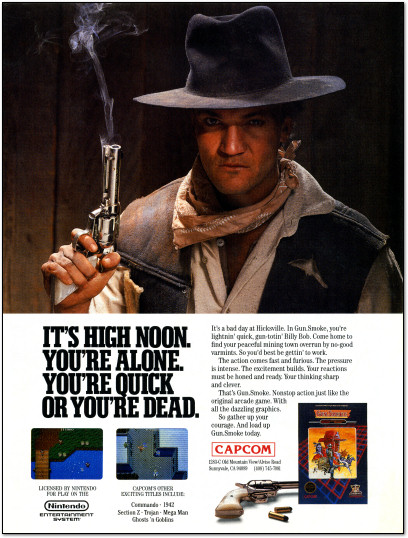 Guns don’t kill people. My grimy hands do.
Guns don’t kill people. My grimy hands do.
[ From Nintendo Fun Club News, April-May 1988, p.13 ]
Discussion Topic of the Week: Have you ever fired a gun in real life? Do any video games successfully replicate that experience?
Posted in Gaming History, NES / Famicom, Regular Features, Retro Scan of the Week, Retrogaming | 11 Comments »
Tags: 1988, Capcom, Gunsmoke, NES, Nintendo, Nintendo Fun Club News, Retro Scan
September 17th, 2012 by Benj Edwards
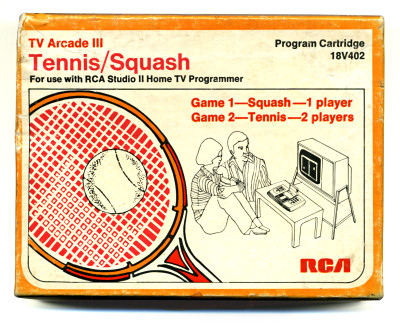 A stunningly realistic RCA Studio II gameplay session.
A stunningly realistic RCA Studio II gameplay session.
Here’s the box cover of TV Arcade III: Tennis/Squash for the for the RCA Studio II (1977), the world’s second ROM cartridge-based video game console.
The early console, which featured only two numeric keypads for control, was such a dog that I named it the “worst video game console of all time” in a 2009 PC World slideshow. Three years later, I stand by that assessment.
You may be asking yourself why RCA prefaced the game title with “TV Arcade III.” Well, silly, that’s because it was part of a sequence of “TV Arcade” games for the RCA Studio II that started with “I” and ended with “IV.” That’s exactly, I might add, how the ancient Romans would have labeled their video games.
[ From RCA Tennis/Squash Box, circa 1977, cover ]
Discussion Topic of the Week: Have you ever played an RCA Studio II? What did you think?
Posted in Gaming History, Regular Features, Retrogaming | 5 Comments »
Tags: 1977, box art, RCA, RCA Studio II, Retro Scan
September 10th, 2012 by Benj Edwards
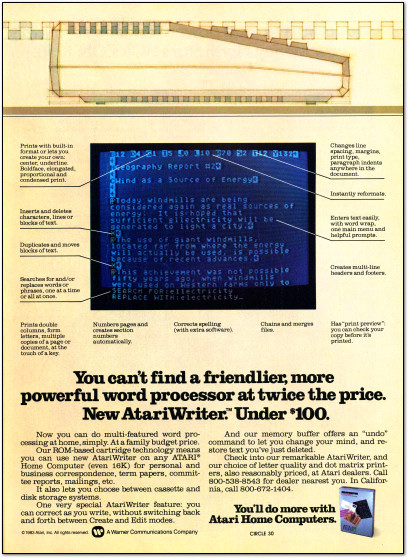 “You won’t find a bluer word processor package anywhere…”
“You won’t find a bluer word processor package anywhere…”
[ From Personal Computing, November 1983, p.43 ]
Discussion Topic of the Week: What was the first word processor software you ever used?
Posted in Computer History, Regular Features, Retro Scan of the Week, Vintage Computing | 24 Comments »
Tags: 1983, Atari, Atari 400, Atari 8-bit, Atari 800, AtariWriter, Personal Computing, Retro Scan, word processors
September 3rd, 2012 by Benj Edwards
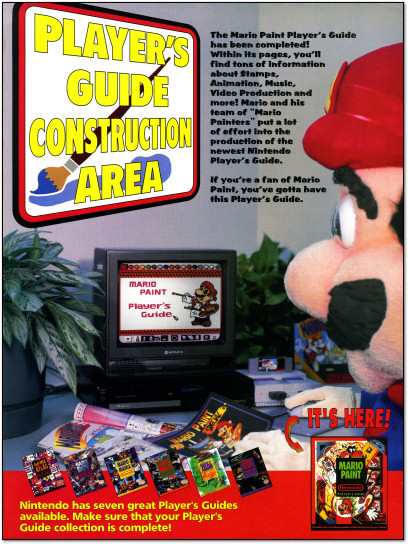 Quite frankly, Mario is stunned — just stunned — by that potted plant.
Quite frankly, Mario is stunned — just stunned — by that potted plant.
[ From Nintendo Power, July 1993, inside back cover ]
Discussion Topic of the Week: Tell us about your most novel experience with Mario Paint. Did you make any music or animations?
Posted in Gaming History, Regular Features, Retro Scan of the Week, Retrogaming | 3 Comments »
Tags: 1993, Mario, Mario Paint, Nintendo, Nintendo Power, player guide, Retro Scan, SNES Mouse, Super NES
August 28th, 2012 by Benj Edwards
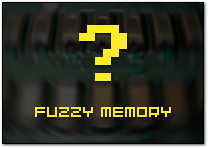 Every once and a while, I receive emails from people looking for a certain game, electronic toy, or computer from their distant past. I then pass it on to intrepid VC&G readers to crack the case.
Every once and a while, I receive emails from people looking for a certain game, electronic toy, or computer from their distant past. I then pass it on to intrepid VC&G readers to crack the case.
The Clues
Richard writes:
My father’s birthday is fast approaching, and I want to find him one of his classic games from the Commodore 64. Unfortunately, the name has been lost in time and his fuzzy memory, though the details of it remain. He often remarks about the amazing depth given to characters in the game.
The plot was a mystery of some sort, set in various Bulletin Board Systems. Some clues would be several messages back in the board, and various NPCs would post messages to the board at key points in the story. When connecting to a board, it would slide in from right to left, and then wobble slightly as it stabilized. Apparently the game itself was very well built, apparently having rather good word recognition, allowing for normal-ish conversations.
Beyond that, I know very little about the game. Hopefully the you can help me out, I’d really like to see this game for myself, and I’m sure it would bring him a great deal of joy. Hopefully what I have will be enough.
Thanks for any help,
Richard
The Search Begins
It’s up to you to find the object of Richard’s fuzzy memory. Post any thoughts or suggestions in the comments section below. Richard will be monitoring the comments, so if you need to clarify something with him, ask away. Good luck!
—
Have a memory of a computer, video game, computer software, or electronic toy you need help identifying? Send me an email describing your memories in detail. Hopefully, the collective genius of the VC&G readership can help solve your mystery.
Posted in Computer Games, Computer History, Fuzzy Memory, Gaming History, Regular Features, Retrogaming, Vintage Computing | 7 Comments »
August 27th, 2012 by Benj Edwards
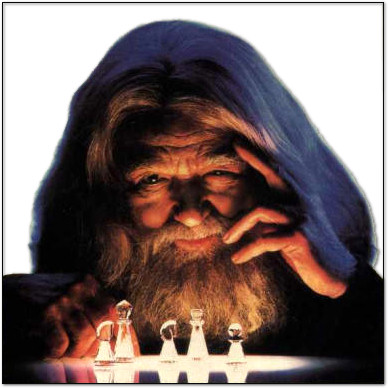 The Chessmaster (1916-1997)
The Chessmaster (1916-1997)
This iconic wizened head loomed large over my childhood. It is the image of the Chessmaster, a fictional chess opponent who stars in a software series of the same name.
That series began way back in 1986 with The Chessmaster 2000, a comprehensive chess simulator that first appeared on 8-bit computer platforms like the Apple II, Atari 800, and Commodore 64. Published by The Software Toolworks, it spawned a series of at least 16 titles that quickly became the best-selling chess software franchise of all time.
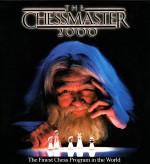 My older brother always loved chess games, so I saw that aged face — a perennial feature of Chessmaster box art — many times throughout the 1980s and 1990s. I always wondered: who was the Chessmaster, really? Who was the real man behind that wise old face? Was he really that old or was he just wearing a wig?
My older brother always loved chess games, so I saw that aged face — a perennial feature of Chessmaster box art — many times throughout the 1980s and 1990s. I always wondered: who was the Chessmaster, really? Who was the real man behind that wise old face? Was he really that old or was he just wearing a wig?
Fast forward to 2006. Thinking I’d write about it on this blog, I emailed Ubisoft (the current publisher of The Chessmaster series) and asked them if they knew who portrayed the Chessmaster. Of course, they had no idea — institutional memory is sorely lacking in most tech companies, and it’s even worse in the software industry. Today I know better than to even bother asking.
Instead of tracking down everyone who worked on Chessmaster 2000 and interrogating them (although I considered it), I figured I’d bide my time and put the somewhat trivial issue on the back burner. The Internet has a way of consuming information and making it available to everyone online, so I thought the answer would pop up one day.
It did.
[ Continue reading The Chessmaster Died in 1997 » ]
Posted in Computer Games, Computer History, Gaming History, Retrogaming, Vintage Computing | 20 Comments »
August 27th, 2012 by Benj Edwards
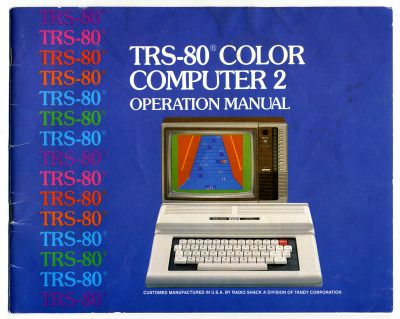 Every instance of those 16 TRS-80 logos is trademarked, so hands off!
Every instance of those 16 TRS-80 logos is trademarked, so hands off!
See also: Hot CoCo (2) for Christmas (2007)
[ From TRS-80 Color Computer 2 Operation Manual, 1983, cover]
Discussion Topic of the Week: Have you owned a TRS-80 Color Computer (any model)? Tell us about it.
Posted in Computer History, Regular Features, Retro Scan of the Week, Vintage Computing | 8 Comments »
Tags: 1983, CoCo, Color Computer 2, instruction manual, Radio Shack, Retro Scan, Tandy, TRS-80

 In honor of our 10th anniversary, I’ve uploaded all 134 of our songs to The Internet Archive with the hope that it will preserve our effort for posterity.
In honor of our 10th anniversary, I’ve uploaded all 134 of our songs to The Internet Archive with the hope that it will preserve our effort for posterity.





 Every once and a while, I receive emails from people looking for a certain game, electronic toy, or computer from their distant past. I then pass it on to intrepid VC&G readers to crack the case.
Every once and a while, I receive emails from people looking for a certain game, electronic toy, or computer from their distant past. I then pass it on to intrepid VC&G readers to crack the case.





